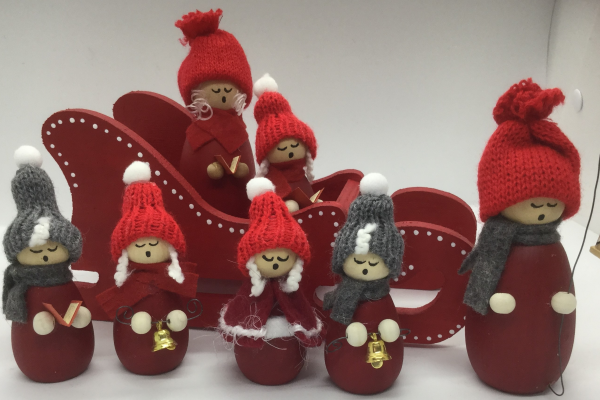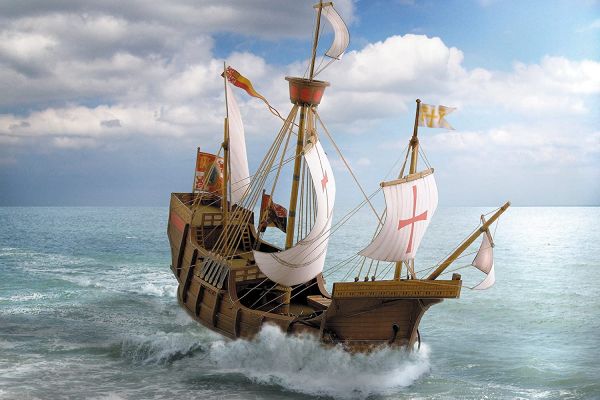
Some Christmas Traditions and how they came to be
On this day, over two billion people (over a third of the world's population) will celebrate the birth of Christ.
Whilst the holiday has a strong grounding in the story of the birth of Jesus, many of the traditions we associate with Christmas have evolved from pre-Christian beliefs and certainly, the traditions have evolved beyond purely a Christian holiday to have a wider significance.
The celebration of Christmas in late December is certainly as a result of pre-existing celebrations happening at that time, marking the Winter Solstice.
Most notable of these is Yule (meaning 'Feast'), a winter pagan festival that was originally celebrated by Germanic people. The exact date of Yule depends on the lunar cycle but it falls from late December to early January. Several Yule traditions are familiar to the modern celebration of Christmas, such as Yule Log, the custom of burning a large wooden log on the fire at Christmas; or indeed carol singing, which is surprisingly a very ancient tradition.
Christmas Traditions
Mistletoe
Kissing someone who happens to be stood under a sprig of mistletoe is seen as a tradition popularised in Victorian England. However even this relatively modern tradition has much more ancient echoes in that Mistletoe bears its fruit around the time of the Winter Solstice, and it’s supposed mythical ability to heal and increase fertility.
In Norse mythology, an arrow made from mistletoe killed Balder, who was a brother of Thor. Frigga, Balder's mother brought him back to life shedding tears that changed the red berries on mistletoe to white. Frigga then blessed the mistletoe and promised a kiss to anyone who passed beneath it.
A hint of Mistletoe's integration from pagan ceremonies into Christmas tradition is said that the mistletoe plant used to be a tree, and its wood was used to make the cross on which Jesus was crucified. After the Crucifixion, the plant shrivelled to became the parasitic vine we know today.
Carol Singing
The tradition of singing of songs can be traced back to the pagan festivals before the advent of Christmas. Indeed, the word carol is derived from the Greek word "choraulein", which meant "an ancient circle dance performed to flute music."
As carols were already an established custom, early Christians made the shrewd decision to integrate Christian songs into the tradition rather than ban the singing.
Carols received an injection of popularity when St. Francis of Assisi started his Nativity Plays in Italy in 1223, which included songs written in the local people's language.
The tradition of 'Modern' Carol singing flourished in England. Known as Wassailing, it was a chance for peasants to get some much-needed charity from their feudal lords. This singing for money developed in a custom involving travelling musicians who would visit wealthy homes, singing in the hope of receiving money food or gifts in return.
There was a short interruption in 1647 when the Puritans come to power after the English Civil War. The Puritans, under the leadership of Oliver Cromwell, disapproved of the celebration of Christmas. There was even a fine of up to five shillings for anyone caught singing Christmas carols. When King Charles II came back to the throne in 1660, the public singing of Christmas carols was permitted again.
Christmas Customs in Spain
24th December marks the beginning of Pascuas de Navidad in Spain. It is a period of celebration that continues until 6th January.
However, for many, the Christmas holidays begin on 22nd December the Loteria de Navidad takes place. Known as El Gordo ('the fat one'), it's the biggest lottery in the world, with 98% of the population participating. It has a total payout of nearly $3 billion, with a 1 in 6.5 chance of winning a prize, which range from 20 euros to 400,000 euros.
A traditional feature of the televised Christmas draw is the participation of students from Madrid's San Ildefenso school. Every time a numbered ball is drawn, two uniformed schoolchildren sing the ball's number and the corresponding prize amount.
Did you know?
Three facts about Christmas Day
Good King Wenceslas was not a king - he was a Duke.
Tiny Tim in Dickens A Christmas Carol was originally called Little Fred.
The song, "Silent Night" has been translated to more languages than any other holiday tune.


